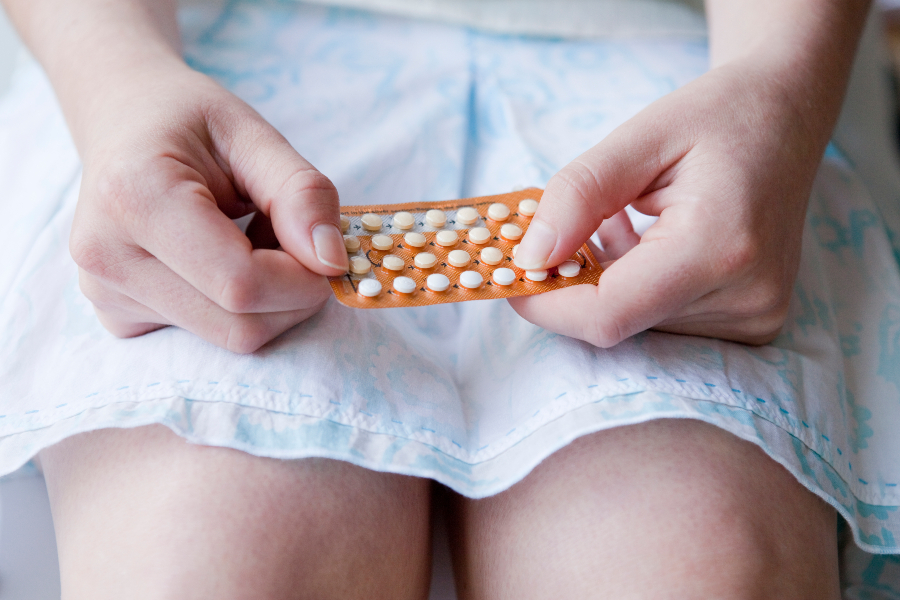Help! I’m Stopping Birth Control and Have No Idea What to Expect
We chatted with a local OB/GYN about what can happen physically, emotionally and hormonally when coming off a contraceptive.

Many people use some form of birth control, yet don’t know much about what happens when they stop using it. / Photograph via Getty Images
“I’m New at This” is Be Well Philly’s series for new and soon-to-be parents. This educational resource covers the ins and outs of prepping for the arrival of a little one and taking care of them — and yourself — with insight and advice from local experts. Tips featured in “I’m New at This” are recommendations, and we believe in pursuing methods and approaches that work best for your unique family. Have a question you’d like to see answered? Email Be Well editor Laura Brzyski at Lbrzyski@phillymag.com.
Recently, in a local Facebook group, one person asked for insight into coming off birth control. As a long-term user of the pill, I grew curious: What might happen — physically, emotionally, hormonally — if I were to ever stop mine?
But when I scrolled through the comments, there were more questions than answers, more confusion than clarity. Turns out, a good amount of people — nearly 50 percent of Americans, actually — don’t know much about contraceptives, likely because sex education isn’t standardized across the U.S. and the topic has historically been viewed as taboo. And yet, a ton of people across the world use birth control methods like the pill, patch, IUD or shot. How can so many of us not have any idea what to expect if we stop it?
That’s why we chatted with Nancey Hahn, a doctor specializing in obstetrics and gynecology for Axia Women’s Health in Paoli. Below, Hahn explains what to generally expect when a person stops various forms of birth control. It’s important to keep in mind that each category of birth control is different in terms of how long it takes for the hormone to leave your body and what you’ll experience physically and hormonally as it’s leaving.
Plus, much of what a person will experience depends on a variety of factors, including the type of birth control, personal cycle, pre-birth-control symptoms, length of time they’ve been on birth control, and where they are in their reproductive lifespan. So, Hahn says, there’s no way to predict on an individual level how someone is going to feel or behave when they come off hormonal birth control. Therefore, you might or might not experience described symptoms, and you should speak with a doctor who knows your personal health history when stopping (or starting!) birth control.
Ed. Note: Sure, this post is appearing in our parenting column, but a person can stop taking birth control for any reason — not just to conceive.
How each birth-control type works and what happens when you stop using it
The pill, patch, and ring
The pill — or a similar hormone-delivery system like the patch and the ring — is the most commonly used form of birth control in the United States. It’s also the easiest and fastest type to discontinue — if you stop using it, the hormones that were being delivered to your system will be gone within a day or two. That’s because the pill, patch, and ring create an artificial hormone-environment in your body, which tells your brain to stop sending the signal to your ovaries that brings an egg to maturity and allows you to ovulate. This, in turn, creates a steady state of hormones in your body (versus the ebb-and-flow of hormones of a natural cycle).
You can stop the pill, patch, or ring at any point — you don’t need to finish an entire pack of pills, for instance. Just keep in mind, when you come off the pill, patch, or ring, you’ll go from a constant hormone state to that undulating pattern. When that happens, any “problematic” symptoms — like PMS, premenstrual migraines, heavy or painful periods — that you experienced before going on birth control will re-present themselves. It may take a few months before you notice a complete return to what a normal menstrual cycle and accompanying symptoms are for you, but most people will see that return within the first month. But remember, you can get pregnant as soon as you come off the pill, patch, or ring!
Progestin-containing intrauterine device (IUD)
An IUD sits in the uterus, and the hormone progestin isn’t really systemic, but some users are so sensitive to the hormone that they do feel some symptoms within the first six months of IUD insertion. Progestin tells the lining of the uterus not to grow — meaning it’s not a hospitable environment for an embryo to implant into — and thickens cervical mucus to prevent sperm from entering the uterus.
The main side effect after getting an IUD removed is immediate bleeding for a few days to a few weeks, because the device has been suppressing it. Most people who have an IUD are still ovulating, so symptoms like breast tenderness and mood changes will likely remain when getting the IUD removed (in contrast to pill/patch/ring users). For some people living with endometriosis, there could be a return of pelvic pain because the IUD can help prevent endometriosis growth.
The shot (Depo-Provera)
Depo-Provera is an injection of a high-dose of progestin that lasts for three months. It completely shuts down the reproductive system — turns off all the signals from the brain to the ovaries and thins the lining of the uterus.
Because it’s such a potent dosage, it’s an extremely effective form of birth control. This also means that if you get the shot and eventually want to conceive, you’ll need to plan your stoppage — it can take anywhere from a few months to a year and a half for ovulation to resume. Also, users most commonly experience weight gain and irregular bleeding while getting their shots, but these symptoms will likely cease as the hormone slowly leaves your body.
Under-the-skin rod (Nexplanon)
Nexplanon contains a different form of progestin, and it stays under your skin for three years. When it’s removed, a person might experience immediate bleeding, but also a quicker return to ovulation as compared to the shot (but not as soon as with the pill, patch, or ring).
Other common lifestyle changes
Hahn says she has seen a good chunk of patients experience positive shifts, like increased libido, a greater sense of general well-being, and feeling “more like themselves.” She also notes that stopping hormonal birth control can result in slight weight loss, as birth control typically causes water retention.
Remember, there are some downsides to coming off birth control: If you’re “naturally” prone to PMS, acne or heavy periods, they more than likely will come back. Though, Hahn notes, if you started birth control in your early teens, your system might have matured when you stop it later in life, but you truly won’t know until the artificial hormones leave your body.
Timing of your life plays a role
When you’re on birth control, your ovaries are still aging. So, you have to realistically consider the lifespan of the reproductive system. If you started birth control at age 30 and stopped it five years later, your fertility might be lower — not because of how long you were on birth control, but because of the timeframe you were on it.
That said, research does not suggest that being on birth control long-term causes infertility or compromises fertility. If you’ve been on birth control for a good portion of your young adulthood and are having difficulties getting pregnant in your 30s or 40s, that might be because of where you are in your reproductive lifespan.
When to expect your period when it has been predictable for so long
No matter what form of birth control you’ve been taking, it’s going to take a bit of time for your ovaries to reset and for you to have a natural (i.e. birth-control-less) cycle. A normal or regular period happens every 28 to 32 days, so you might expect yours to arrive sometime around then. Also, most people’s bodies give them signs as to when their period is coming, like cramping, breast tenderness, or slight spotting. That way, you won’t be totally caught off guard — and can avoid wearing a “just in case” pad or tampon every single day!


